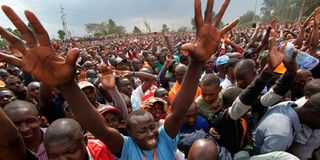Uphold children’s rights in this electioneering period

A past political rally at Kamukunji grounds in Nairobi.
What you need to know:
- We cannot leave children out of elections as elections do not leave out children.
- Children are usually exposed to violence on television and other media platforms.
Children might easily fall prey to political games and manipulation during electioneering. Political actors often try to take advantage of them in their bid to emotionally influence the electorate. Politicians visit schools, student choirs perform at a political events and student council representatives are influenced by politicians to campaign for a political formation.
While children are known not to vote, they have always borne the brunt of the violence and anarchy that result from poorly managed elections. They are most adversely affected by poll violence in Kenya.
The police brutality in Kisumu in 2013 led to six-month-old Baby Samantha Pendo’s death. Or the fatal shooting of Stephanie Moraa Nyarangi, 9, on the balcony of her home. We cannot leave children out of elections as elections do not leave out children.
Most children of the age of comprehension who hear tales of post-election violence become anxious as they do not know what to expect. Deep fear and uncertainty can trigger psychological distress for all people but children are more vulnerable.
Moreover, children are usually exposed to violence on television and other media platforms. Newsrooms have shared coverage of politicians spewing hate messages and incitement to violence. Graphic images of fights and even people being killed have been shared on media with a lasting effect on them.
Exploitation and manipulation
A Duke University Center for Child and Family Policy study found that children show increased delinquent and aggressive behaviours years after they were exposed to violence. That is buttressed by a study by the University of Anbar, Iraq, that the impact of violence on a child’s future psychological well-being depends on their age, coping mechanisms and cognitive and verbal abilities.
Children feel more secure in a peaceful community. The Constitution treats them as marginalised, in need of protection. They should enjoy their right to civil and political participation but be protected from political exploitation and manipulation.
Upholding child rights in this political season requires a multi-faceted approach, including, firstly, sensitisation of the public about the impact of violence on children. Experts like psychologists and civil society can make the public aware of the violence they could experience and provide referrals.
Secondly, sensitise politicians to look out for child rights. Legal action should be taken against those who engage children in campaigns or allow them into public spaces where the meetings are held. Parents and guardians should restrict children’s access to rallies and all manner of election-related protests and media that broadcast violence.
Media should abide by their policies and guidelines which reflect an understanding that children can be harmed by what they see and hear. Their content should have due regard to young minds.
Mr Okero is an elections expert; [email protected].
Dr Oloo (PhD) is a human rights expert and CEO at EACHRights; [email protected].





